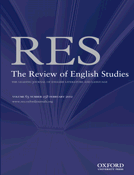-
Views
-
Cite
Cite
Charlotte Brewer, ‘Happy Copiousness’? OED’s Recording of Female Authors of the Eighteenth Century, The Review of English Studies, Volume 63, Issue 258, February 2012, Pages 86–117, https://doi.org/10.1093/res/hgq102
Close - Share Icon Share
Abstract
Eighteenth-century language usage is markedly under-represented in the first two editions of the OED, whose quotations for this period were gathered almost entirely during the late nineteenth and early twentieth centuries. This article reviews some of the possible causes, characteristics and consequences of OED’s gap in eighteenth-century documentation and shows that female authors were particularly scanted. The role of quotations in the OED, as the evidential basis for the dictionary, is briefly considered, along with eighteenth-century (and Victorian/Edwardian) views on women and language, and the availability of female-authored texts for quotation by the lexicographers. The article reports sample reading in eighteenth-century female writers (especially Jean Adam, Penelope Aubin and Anna Seward), which shows that OED could easily have supplied its eighteenth-century deficiency from such authors, and that it often favoured distinctive usages in female-authored texts—innovative, eccentric or domestic vocabulary—rather than usage which exemplified linguistic norms (especially in poetry, where Seward’s case is examined). It also discusses revisions to the OED so far conducted in the third (ongoing) edition, and their implications for readers and editors of eighteenth-century texts.



